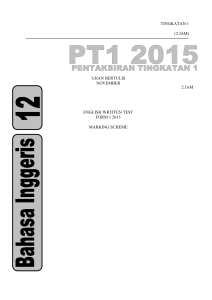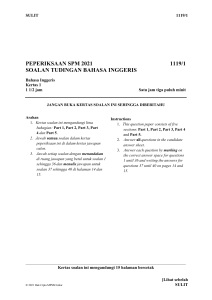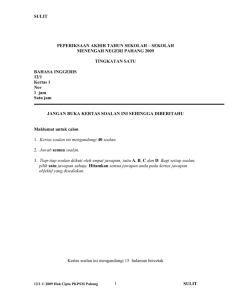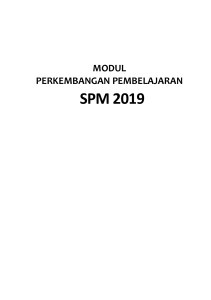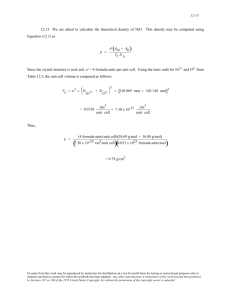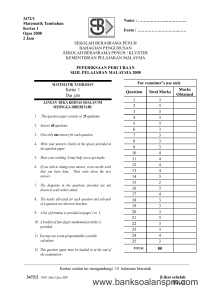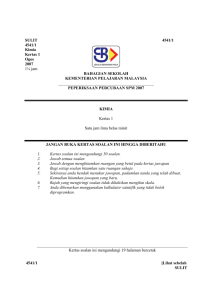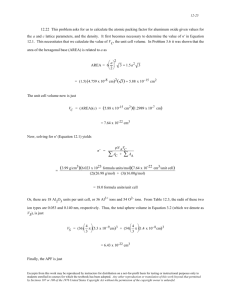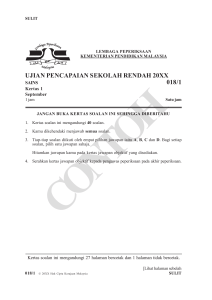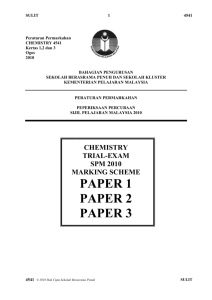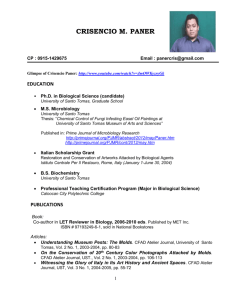R - Bank Soalan SPM
advertisement
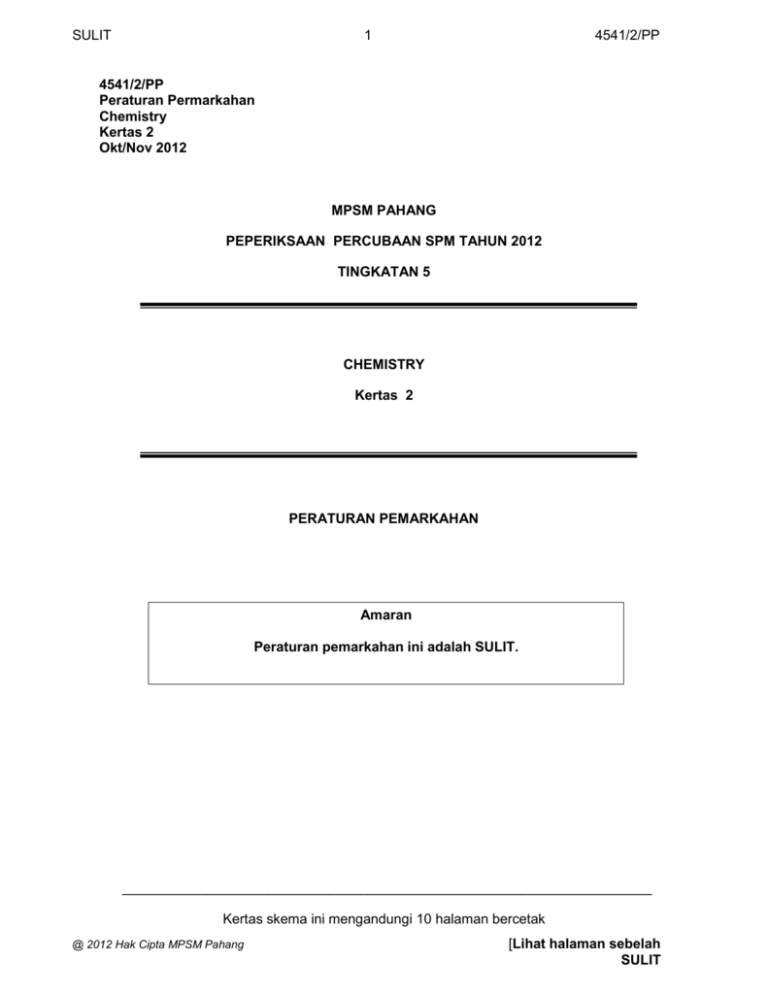
SULIT 1 4541/2/PP 4541/2/PP Peraturan Permarkahan Chemistry Kertas 2 Okt/Nov 2012 MPSM PAHANG PEPERIKSAAN PERCUBAAN SPM TAHUN 2012 TINGKATAN 5 CHEMISTRY Kertas 2 PERATURAN PEMARKAHAN Amaran Peraturan pemarkahan ini adalah SULIT. _____________________________________________________________________ Kertas skema ini mengandungi 10 halaman bercetak @ 2012 Hak Cipta MPSM Pahang [Lihat halaman sebelah SULIT SULIT 2 4541/2/PP MARKING SCHEME / SKEMA PERMARKAHAN CHEMISTRY PAPER 2 TRIAL SPM MPSM PAHANG 2012 NO Answers Marks 1.a) C3H6 1 b)(i) CnH2n+1 OH 1 (ii) C3H7OH c) H H C3H6 + H20 H 1 H H H H- C –C- C - H H – C – C – C -O H H H 1+1 H H OH H Propan-1-ol Propan-2-ol (any one) d)(i) Propane (ii) C3H6 + H2 e)(i) 1 C3H8 -Formula reactant correct 1 -Formula product correct 1 Propyl ethanoate 1 9 2.a) (i) Number of proton in nucleus of its atom 1 (ii) 15 1 b) Nucleon number 1 Q and R have different number of neutron/nucleon number 1 Carbon 14 - to estimate the age of fossils and artifacts 1 c)(i) (ii) Cobalt 60 - kill cancer cells,sterilised medical instruments Sodium 24-detect leakage of underground pipes (any one) d (i) 2.8.7 1 (ii) 7 1 iii) Draw diagram: - @ 2012 Hak Cipta MPSM Pahang R [Lihat halaman sebelah SULIT SULIT 3 - 4541/2/PP Figure of electron arrangement of R 1 3 shells 1 9 3.a) ( i) Z 1 (ii) Q 1 (iii) Y 1 b) Q, P, Z, Y, T 1 c) 4 1 d) Z has higher number of protons than T. Hence it has stronger 1+1 nuclei attraction on the electrons. e) Y3+ 1 f) Transition Elements 1 g) Their ions or compounds are colored//They form complex 1 ions or compounds/they are good catalysts//They can have variable oxidation. 10 4.a) b.(i) (ii) H+ , Cu 2+ , 1 SO42- , OH - 1 Bubbles of gas released Concentration of Cu 2+ decrease // Cu 1 2+ 1 discharge to form Cu atom (c) d)(i) Cu2+ + 2e Cu Anode become thinner / smaller / mass 1 1 decrease (ii) Cathode become thicker / bigger / mass 1 increase e) Correct diagram 1 Copper electrode at anode Steel spoon at cathode Copper (II) sulphate as electrolyte Correct label @ 2012 Hak Cipta MPSM Pahang 1 [Lihat halaman sebelah SULIT SULIT f) 4 4541/2/PP Hydroxide ion 1 10 5.a) b) Pink to colourless 1 The point in the titration at which the indicator changes 1 colour 1+1 c) H2SO4 + 2NaOH d) Sodium sulphate and water 1 e) M1V1 = 1 M2V2 2 1 0.25 × V1 = 1 0.5 × 25 2 1 Na2SO4 + 2H2O V1 = 1 × 0.5 × 25 2 × 0.25 1 = 25cm3 f) 50 cm3 g) i) Vinegar is used to cure wasp sting that alkaline in nature 1 ii) Toothpaste contain bases to neutralize acid produce by 1+1 bacteria 11 6. a) Redox reaction is a reaction in which oxidation and reduction 1 occur at the same time b) Oxygen and water 1 c) Fe → Fe2+ + 2e 1 d) Label of water droplet, oxygen and iron 1 Label of anode and cathode 1 Draw arrow from negative to positive pole iron 1 @ 2012 Hak Cipta MPSM Pahang [Lihat halaman sebelah SULIT SULIT e) f) 5 4541/2/PP Electron transfer form anode to cathode 1 Oxygen in water gains electrons 1 Hydroxide ion is form 1 Using sacrificial metal // sacrificial protection / By alloying / By tin platting / By galvanizing (Any two) 1+1 11 7 height of precipitate/ cm a) 6 5 4 3 2 1 0 1 2 Correct axis with unit Correct and Smooth line Correct scale @ 2012 Hak Cipta MPSM Pahang 3 4 5 6 7 1 1 1 [Lihat halaman sebelah SULIT SULIT 6 4541/2/PP b. (i) (ii) c) d.(i) (ii) iii) Pb(NO3)2 + 2KI PbI2 + 2KNO3 1+1 Volume of Pb(NO3)2 = 2.5 cm3 1 No of mole Plumbum (II) ion = 1 x 0.0025 = 0.0025 mol 1 No of mole iodide ions = 2 x 0.0025 = 0.005 mol 1 Pb2+ +2 I- PbI2 Correct reactants and products 1 Balance equation 1 Salt X = Copper (II) carbonate 1 Gas Z = Carbon dioxide 1 Y precipitate = Barium sulphate 1 CuSO4 + Ba(NO3)2 Cu(NO3)2 + BaSO4 Correct reactants and products 1 Balance equation 1 1. Add sodium hydroxide solution. 1 + 2. Blue precipitate formed indicates the presence of Cu ion. 1 3. Add hydrochloric acid. 1 4. Add barium chloride solution. 1 5. White precipitate formed indicate the presence of SO42- 1 ion. 20 8. a) 1. the mixture becomes hot 2. the thermometer reading increase 3. zinc powder dissolves 4. brown solid/precipitate formed 5. the blue solution turn colourless (Any three) @ 2012 Hak Cipta MPSM Pahang 1+1+1 [Lihat halaman sebelah SULIT SULIT (b)(i) (ii) (iii) 7 4541/2/PP Cu 2+ + Zn Cu + Zn2+ -Correct formula & reactants -correct balance 1 1 Heat released in the reaction -50x4.2x5// 1050 J -number of mol of Cu atom 50x0.1//0.005 mol 1000 -show the step to obtain heat of displacement 1050 J 0.005 mol - heat of displacement with unit and negative symbol -210000 Jmol-1//-210 kJmol-1 1 1 1 1 1 -heat loss to the surrounding 2 precautions 1. use polysterene cup//use two layers of polysterene cup Instead of one. 2. add zink powder quickly into the solution 3. stir the mixture continuously until highest temperature obtained. (Any two) (iv) - temperature change will be doubled//100C - number of copper(II) ions per unit is doubled/ two times higher 1+1 1 1 1 c) (i) Label Energy, correct level of reactants & product - correct chemical equations H with negative symbol and unit 1 1 Zn + Cu2+ H= - 210 kJ mol-1 Energy Zn2+ + Cu @ 2012 Hak Cipta MPSM Pahang [Lihat halaman sebelah SULIT SULIT (ii) 8 4541/2/PP Exothermic reaction//heat released to the surrounding 1 Energy content of reactants is higher than energy 1 content of products Heat absorbed to break down the bond is lower than 1 heat released to form a bond 20 9 a.(i) 1. Tomato puree is used as a colouring agent to restore the colour of the food. 2. Sugar // spice is used as a flavouring agent to enhance the taste of food 3. Permitted modified starch is used as thickener to thicken 2+2 food. (Any two) (ii) Advantage : i) to prevent food from spoilage 1 ii) to improve appearance, texture or taste Disadvantage: i) Lead to serious diseases like asthma, and cancer b. 1 - Part A is hydrophobic: Soluble in oil or grease 1+1 1+1 - Part B is hydrophilic: Insoluble in oil or grease//soluble in water c. 1. Hard water contain Mg2+ and Ca2+ ion 1 2. Detergent does not form scum in hard water 1 3. Soap form scum in hard water 1 4. Mg2+ and Ca2+ in hard water react with soap 1 5. Soap molecule consist of hydrophobic and hydrophilic part 1 6. Hydrophobic part dissolve in oil 1 7. Hydrophilic part dissolve in water 1 8. During scrubbing/rinsing the oily stains/spots is 1 @ 2012 Hak Cipta MPSM Pahang [Lihat halaman sebelah SULIT SULIT 9 4541/2/PP washed away 9. Cloth in experiment II /detergent is cleaner than cloth in experiment I 1 10. Detergent in hard water is more effective than soap. 1 20 10. a.(i) The speed at which reactant are converted into product in a 1 chemical reaction// change in selected quantity of reactant or produrt per unit of time taken. (ii) Total surface area / concentration of reactant / temperature 1+1 of reactant / use of catalyst / pressure of gaseous reactant (any 4) b) c) To make the coffee powder and sugar dissolve easier in water. 1 The heat given to the water will give more kinetic energy to the particles. 1 The particles of water, coffee powder and sugar move faster. 1 They will collide each other more frequent. 1 The frequency of effective collision will increase. 1 Precipitate : Sulphur 1 Materials: 0.2 mol dm-3 sodium thiosulphate, 1.0 mol dm-3 sulphuric acid, a piece of white paper marked ‘X’ at the centre. 1 Apparatus: 150 cm3 conical flask, stopwatch, 50 cm3 measuring cylinder, 10 cm3 measuring cylinder, thermometer, Bunsen burner, wire gauze. 1 Procedure: Using a measuring cylinder, 50 cm3 of 0.2 mol dm-3 sodium thiosulphate solution is measured and poured into a conical flask. The conical flask is placed on top of a piece of white paper marked ‘X’ at the centre. @ 2012 Hak Cipta MPSM Pahang 1 1 [Lihat halaman sebelah SULIT SULIT 10 4541/2/PP 5 cm3 of 1.0 mol dm-3 sulphuric acid is measured using another measuring cylinder. 1 The sulphuric acid is poured immediately and carefully into the conical flask. At the same time, the stop watch is atarted 1 The mixture in a conical flask is swirled. 1 The ‘X’ mark is observed vertically from the top of the conical flask through the solution. 1 The stopwatch is stopped once the ‘X’ mark disappears from view. 1 Step 1 – 7 are repeated using 50 cm3 of 0.2 mol dm-3 sodium thiosulphate solution at 40oC, 50oC, 60 oC by heating the solution before 5 cm3 of sulphuric acid is added in. (Max 8) 1 Conclusion The increase of temperature, increase the rate of reaction 1 20 END OF MARKING SCHEME @ 2012 Hak Cipta MPSM Pahang [Lihat halaman sebelah SULIT
